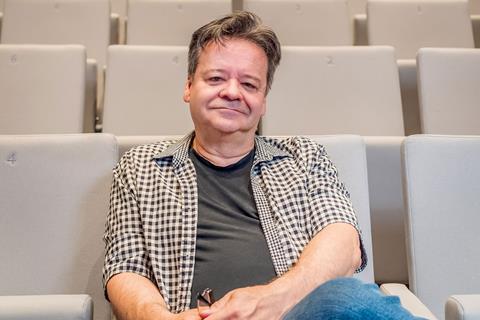
Annecy film festival artistic director Marcel Jean has defended the selection of films made partially using artificial intelligence in its 2024 edition, saying, “It’s important to have the conversation about all this.”
On Sunday (June 9), audience members booed the screening of Chien Mechant’s French music video Etoile Filante, which was made using generative AI software.
According to French audiovisual website 3DVF, the other titles presented in the Commissioned Films screening at that time received applause, but the Etoile Filante video received a mixture of silence and some boos.
“It’s sad, especially for the people who worked on it, but we will not impeach people for booing,” Jean told Screen.
“It’s important to have the conversation, the debate about all this – to look at the works and to comment after. My job is to show what is made. Some people are angry because we are programming AI this year, but in the past there were a lot of things I didn’t appreciate, and that I programmed. Because I don’t programme only what I like.”
The festival also selected Ryo Nakajima’s Who Said Death Is Beautiful?, a feature made using Stable Diffusion AI software in its development, in the Midnight Specials strand.
That selection drew criticism from some in the animation community after April’s line-up announcement, after which Jean issued a statement saying: “It is important to be attentive to the evolution of things and to react with the discernment, sensitivity, and artistic sense that justify our presence within the selection committees.”
Jean said the evening screening on June 10 of Who Said Death Is Beautiful? passed without incident. He noted that the two works made partially using AI were chosen from many such submissions to this year’s festival.
“If there was only one AI production made this year, it would probably not be here. But if there are a few films that use AI in the programme, it’s because we received a lot,” said Jean, adding that both works come from creators known to the festival.
“When we receive something made by generative AI, by a nobody with no talent, it doesn’t have any interest,” said the director. “But most of the things that were programmed here with AI were made by filmmakers that we know, we heard of, we saw what they did previously, and they tried something with this tool.”
He would not rule out the possibility of more AI films in future Annecy editions. “I don’t have a crystal ball – we will have to take our decision when we will face the production of next year.
“We are making a festival for professionals, for students, with them, and we want to praise their work. So we will not make a festival against them,” continued Jean. He highlighted that the AI feature is one of more than 50 features in the programme.
The festival will not be the main site for the AI discussion, he believes. “If the major studios decide to change their pipeline, and if they massively use AI, Annecy will not be the problem – the whole industry will become the problem,” said Jean.
Jean added he is in regular contact on the issue with French creative unions, which include AnimFrance for animation producers and Association Francaise du Cinema d’Animation for all animation professionals.
“I know that there are a lot of legal and moral questions, but we must know what we are questioning and allow the artists to give their opinion – not just the unions or the lawyers,” he said.
Inclusive values
This year’s festival opened on June 9, the same day that French president Emmanuel Macron called a surprise legislative election, following a heavy defeat for his centrist party L’Europe Ensemble by the far-right National Rally party in the European Parliament elections.
Jean is Canadian and lives mainly in Canada, but gave a passionate defence of Annecy’s international outlook in the face of right-wing nationalism.
“Nobody on the team was happy with what happened,” he said. “It doesn’t fit with our values, with what we want to represent. It doesn’t fit with the way we select films. When we created the Perspectives section for short films, our intent was to be open to more countries – sometimes films from dissidents of different governments. Our values are values of inclusion.”
He also revealed that this year’s festival has a record attendance of over 17,000 registered badgeholders, up by over 1,000 from last year with exact numbers still to be reported.
Acknowledging the challenges of finding space for the extra people, Jean said work will be completed by spring 2026 on the new year-round animation centre at Haras, a former horse stables in the centre of town. The venue will include welcome and registration facilities for the festival, a 300-seat screening room, and space for animation exhibitions.















![[L-R]: Amanda Villavieja, Laia Casanovas, Yasmina Praderas](https://d1nslcd7m2225b.cloudfront.net/Pictures/274x183/6/4/1/1471641_pxl_20251224_103354743_618426_crop.jpg)









No comments yet